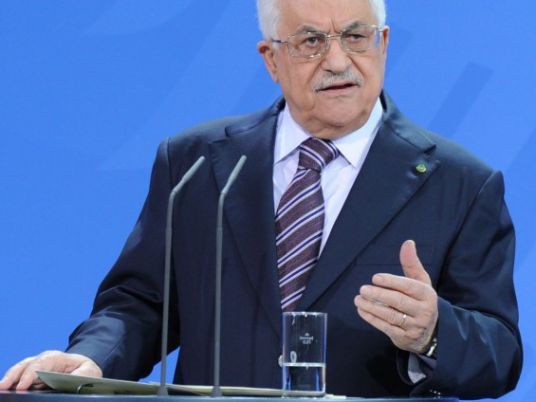
Rather than keep his cards close to his chest, President Mahmoud Abbas is playing them all at once in a confusing effort to advance Palestinian statehood and bolster his own fragile legitimacy.
In the past few weeks, he has veered from saying he will confront Israel at the United Nations as the head of a newly-minted state of Palestine to threatening to turn over his government to Israel because it is powerless.
While still pursuing US-led peace talks, he stunned Washington on Wednesday by striking a unity deal with his Islamist rivals Hamas, which is dedicated to Israel's destruction and is viewed by the West as a terrorist group.
Supporters of Abbas, widely known as Abu Mazen, say the maneuverings show he has many options and is astutely lining up his pieces. Critics say the 78-year old leader is aloof, unfocused and simply thrashing around for ideas.
"Abu Mazen is well aware that the legitimacy of the Palestinian political system as a whole is over and the Palestinian situation is catastrophic and in the worst stage of its history," said Hussam Khader, a former parliamentarian from Abbas's own Fatah party.
Clearly the question of legitimacy bothers Abbas.
Elected president in 2005, his mandate expired five years ago, but Palestinian divisions have prevented any new vote, with Hamas fully in control of the Gaza Strip, while Abbas enjoys limited self-rule in the Israeli-occupied West Bank.
His urgent bid for national reconciliation, which is due to lead to elections within six months, is popular at home and appears aimed at gaining the missing mandate for whatever may follow Israeli negotiations that are set to expire on April 29.
"Elections, by principle, are our choice, whether the talks succeed or they fail, because we want to renew our legitimacy," Abbas said on Tuesday.
"We're not saying 'it's either Hamas or it's Israel' … If elections are agreed, I'm with the reconciliation and also Israel is a partner for the peace process. A sovereign state won't be achieved except through negotiations."
Frozen
Although Abbas believes that reconciliation and peace talks are compatible, the Israelis and Americans do not.
Abbas is seeking a Palestinian state in Gaza, the occupied West Bank and East Jerusalem, lands Israel captured in the 1967 Middle East War. The latest round of negotiations started last July and were meant to last just nine months.
However, both sides say the discussions failed to tackle substantive issues like borders and security arrangements, while Israel announced thousands of new settler units on occupied land and the two sides bickered over recognizing Israel as a "Jewish state." US efforts to prolong the talks have not made headway.
Coming at such a delicate time, the unity drive has enabled Israeli Prime Minister Benjamin Netanyahu to pin the blame on Abbas for the impending failure and Washington has warned that it will review hundreds of millions of dollars in aid that help keep the Palestinian Authority afloat.
So Abbas appears to be taking a big risk on a unity push that has so often failed in the past.
Hamas won the last Palestinian parliamentary polls in 2006 and a year later grabbed control of Gaza after a brief civil war against Abbas's Western-backed Fatah faction.
No national elections have occurred since then and rancor between Fatah and Hamas runs deep, with both sides imprisoning their rivals in their respective power bases and building up parallel security forces.
Yasser Abed Rabo, the deputy head of the Palestine Liberation Organization (PLO), an umbrella group for most mainstream political parties, made clear on Thursday that the unity deal may never be implemented.
"This step shouldn't be exaggerated…We need to watch the behavior of Hamas on many details during the coming days and weeks," he told Palestinian radio on Thursday.
Confused
The unity accord was the second time in a month that Abbas had blindsided his US allies, following, as it did, his sudden signature of 15 international conventions in a move intended to boost Palestine's statehood credentials.
The Palestinian leader said he was forced to take the unilateral step because Israel had failed to honor its pledges – a position that at the time Washington appeared to accept.
Abbas says there are almost 50 other treaties that he might yet sign, including an application to join the International Criminal Court in the Hague – a platform the Palestinians might use to pursue Israel for its prolonged military occupation.
After this move, Abbas confused friend and foe alike earlier this week when he revived a long-standing threat to devolve the powers of the Palestinian Authority's limited self-rule in the occupied West Bank onto Israel, saying Israel could bear "full responsibility" for policing Palestinians, paying public employees and funding institutions.
"Yesterday the Palestinians talked about dismantling the Authority and today they talk about unifying with Hamas; they should make up their minds if they want dismantling or unification," Netanyahu said on Monday.
"When they want peace, let us know," he added, seeming to sense a potential PR victory over the Palestinian leadership.
The president's domestic critics say his policy shifts suggest that he has concentrated too much power in his hands, and is caught between polishing his image on the Palestinian street and trying to please the United States.
"He behaves very much like a person who doesn't have a mandate, said Diana Buttu, a former legal adviser to Palestinian peace negotiators.
"You see things like the UN initiatives, which were designed to boost his credibility. Then the negotiations, which were not credible and not popular, so then he signed the recent (international) agreements."
When the last round of peace talks fizzled in 2010, Abbas strived to gain full membership of the United Nations, but quickly abandoned that campaign when it became clear he could not overcome a US veto in the UN Security Council.
He adopted a new line of attack in 2012, winning an overwhelming vote in the UN General Assembly to let Palestine become a non-member observer state, but instead of pursuing this unilateral path he reverted to direct negotiations with Israel.
Fatah leaders insist they are confident in the president's decisions on behalf of the national cause now that yet another round of talks predictably totter towards failure.
"We have our choices and we have our weapons at the international level and at the level of getting the internal Palestinian house in order," Fatah official Abbas Zaki told Palestinian radio on Tuesday.
If the Hamas deal implodes, Abbas is looking at ways of holding elections in Gaza via mobile phones or the internet, or limiting elections to the West Bank for interim terms, Palestinian officials told Reuters on condition of anonymity.
Such a move would at least be coherent.
"If they fail to convince Hamas of elections in the West Bank and Gaza, I think they should go for elections for wherever it's possible. This will be a necessary, crucial maintenance," said Ghassan Khatib, a former Palestinian government minister and now academic at Birzeit University in the West Bank.




